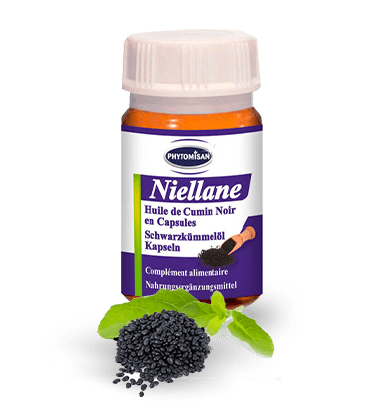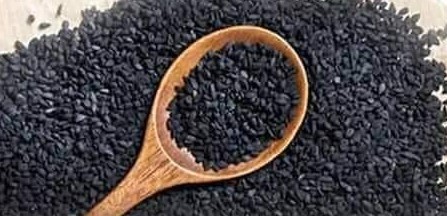It can go by many names, black cumin seed oil, black caraway oil, and even pharaoh oil. Black cumin oil has many virtues.
Nigella oil has been known for several centuries and is used in ancient medicines. We find traces of its use more than 3 years ago, in Egypt among the pharaohs, notably used by Cleopatra for her skin, which gave it the nickname of oil of the pharaohs. Even today, research continues on its beneficial health effects. It is used more and more as its action is diversified and because it has no side effects.
Where does this prodigious oil come from? Its origin takes us to Asia where we first find the nigella sativa plant. Belonging to the same botanical family as the buttercup, (ranunculaceae). This miraculous plant conceals small black seeds.
It is these small seeds that also give it the nickname of black cumin oil.
Its properties are numerous: antioxidant, painkiller, antibacterial, antiviral, healing, toning… All this thanks to the nigellone, crystalline and thymoquinone contained in this plant in addition to the many beneficial acids and vitamins, calcium, iron, copper or even zinc. All this in a single plant that makes naturopaths and doctors happy!
Here are some of its uses that will convince you to make it your daily ally!
Nigella oil as a preventative for cancer
Research has demonstrated the interest of combining usual chemo-therapeutic treatment with the active ingredients of Nigella oil: the treatment is more effective, toxicity is reduced.
In colon cancer, it could even be a chemo-therapeutic treatment! Or in the treatment of lung cancer, because this oil limits the life of diseased cells.
A natural treatment for type 1 and 2 diabetes
Research is paying close attention to black cumin oil for the treatment of diabetes. Indeed, this product makes it possible to gradually regenerate pancreatic cells while reducing sugar levels: an asset for type 1 diabetes. For type 2 diabetes, the oil of the pharaohs allows insulin to be more effective and much research is underway on this property which could help many patients.
An oil that helps digestion.
Black cumin oil has antispasmodic properties. It will then allow you to fight against the undesirable effects of difficult digestion, stomach pain and bloating.
In general, it will help the proper functioning of the digestive system
A slimming asset
We have seen that this miraculous oil has a hypoglycemic property useful for diabetics. This virtue will also be useful in addition to a diet to control sugar levels. In addition, Nigella oil has an appetite suppressant effect, playing on satiety.
Your hair will thank you
Pollution, fatigue, stress or advancing age can have disastrous effects on our hair.
At the capillary level, black cumin oil will both:
– Help your hair grow stronger
– Promote their growth
– Prevent or reduce hair loss
In addition, its anti-inflammatory property will relieve cases in your scalp and will even be an excellent fungicide.
In a natural way, you can then help your hair to better understand the sometimes hostile outside!
A boost for your complexion
Studies show that Nigella oil will boost your melanin production and thus allow you to reduce certain imperfections and prevent the appearance of rides.
It will tone your skin to make it more radiant and completely natural. These virtues led Cleopatra, according to historians, to use this oil as a beauty product.
An oil to fight bacteria
We know the scourge in our public hospitals of staphylococcal infections and the heavy use of antibiotics reduces the chances of recovery. Nigella oil has this tremendous ability to naturally eliminate many even dangerous bacteria, staphylococcus therefore, but also salmonella, listeria or E ink.
If you yourself are infected with a bacterium, or if the infection concerns your skin, you can take black cumin oil mixed with an infusion, for example.
Antioxidant power
Black Seed Oil will support your immune system with its many beneficial acids: Myristic Acid, Palmitic Acid, Stearic Acid, Palmitoleic Acid, Oleic Acid, Linoleic Acid, Arachidonic Acid , its vitamins and its antioxidant character.
Its beneficial effects are rapid with results in four weeks! This power helps people who have an autoimmune disease, in particular, without side effects, unlike some treatments.
Against allergies and asthma
Allergies and asthma: two medical phenomena which continue to develop, in particular due to pollution. They can quickly become difficult to live with, unpleasant to bear on a daily basis.

Black cumin oil can be used as an antiallergic and antiasthmatic. In some cases of asthma patients, this oil can be even more effective than the usual treatments.
Research focuses mainly on the treatment of allergic rhinitis, which affects the daily lives of people who suffer from it. Nasal treatment can therefore be effective and thus avoid inconvenience and keys.
All the effects of Nigella oil in one capsule: Niellane
Black cumin oil has therefore been known for millennia for its benefits on our health, and is recognized today as being a powerful digestive stimulant, an antispasmodic, an immunostimulant or even an anti-infective.
Benefit from its many virtues already used by the pharaohs thanks to Niellane. A natural product based on black cumin oil from Egypt, number one of the best plants selected by Dr. Nasim's Phytomisan laboratory.
Find all its powers in a capsule, and improve your digestive system, take advantage of its anti-inflammatory power, more radiant and stronger skin and less sensitive to natural aging.
Our contemporary rhythms of life are hard to bear for our organism, our skin, our immune system or even our hair. The Niellane dietary supplement will allow you to strengthen your defenses on a daily basis, to regain a form that will shine on all of your projects.
In addition, this product is enriched with minerals, enzymes and essential fatty acids, Niellane will be a powerful detoxifier for your body and an ally for your diet.
Don't wait any longer and make Niellane your slimming, health and beauty ally!
For more info and to order : http://phytomisan.com/niellane-gelules-dhuile-de-cumin-noir/

